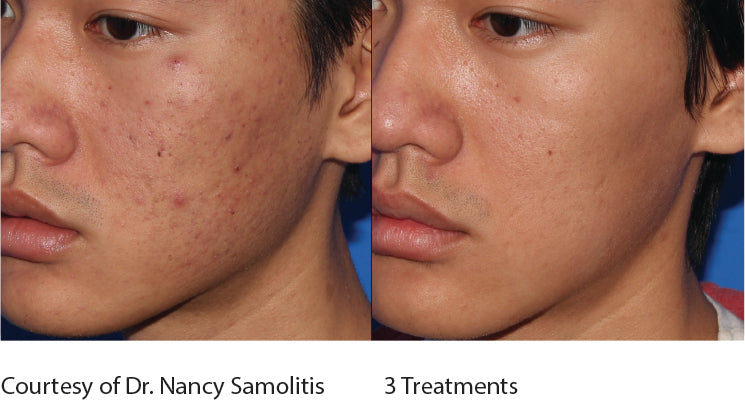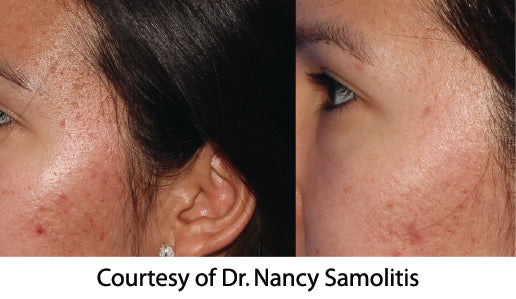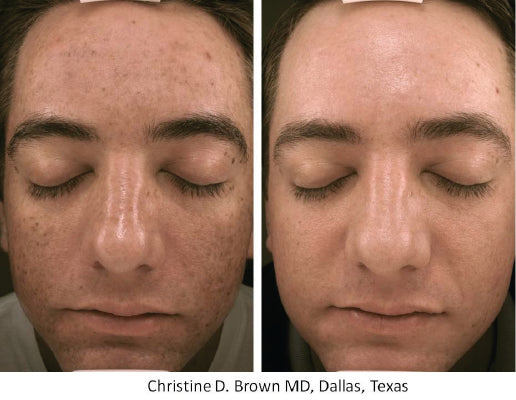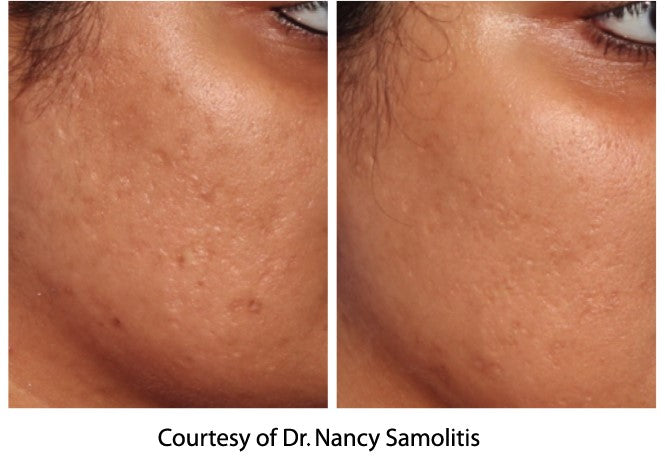Acne Scars
Acne Scar Treatment in Vancouver at Hush Beauty MD
Are acne scars permanent? Dr. Rose offers expert acne scar treatment in Vancouver to restore your radiant natural skin.
Between the ages of 11 and 30, about 80% of people struggle with acne. While acne is temporary, and you can clear your skin with a regular skincare routine, the scars they leave behind aren’t quite as forgiving. Acne scars, unlike their predecessors, stick around for life.
Dr. Rose and the Hush Beauty Anti-Aging and Skin Care Centre have a solution.
Our customized and quality acne scar treatment targets those pesky scars. We focus on lightening the scars while rejuvenating your skin so you see a blemish-free complexion and enjoy younger, more healthy skin.
Ready to say goodbye to your acne scars? Contact Dr. Rose to find the best acne scar treatment in Vancouver.
What Are Acne Scars?
Acne scars are the permanent marks left behind from acne. All acne can lead to scarring, but it’s most common with cystic acne. Cystic acne is deeper, pus-filled cysts under the skin. They’re much larger and more painful than other types of acne.
Acne comes from oil, bacteria, and dirt that clog your pores. Your pores are where the natural oils and sweat from your body leave the skin. When those pores are clogged, it leads to blackheads or inflamed pink bumps with white heads. These are acne or pimples.
After the clogged pores clear themselves or the inflammation heals, the acne can sometimes leave scars. About 20% of people with acne will see scarring.
Body acne scars can appear anywhere you have had acne. However, you’re more likely to see acne scars on your back, face, and shoulders. This is because these areas produce the most oil, which increases the chances of clogged pores.
Acne Marks vs. Acne Scars
All acne leaves behind marks during and immediately after healing. These marks are usually discolorations that lie flush on the skin. Acne marks heal naturally with time.
On the other hand, acne scars are permanent marks and discolorations on the skin that usually require professional face, shoulder, or back acne scar treatment to reduce their appearance.
Different Types of Acne Scars
Not all acne scars look the same, just like not all acne is the same. The type of acne scarring you have will decide the most effective treatment options. Here are the most common acne scar types:
Depressed Acne Scars
These acne scars are small indentations in the skin where the acne was. They are the most common type of acne scarring and usually come after more severe outbreaks.
Depressed acne scars have three primary appearances:
- Rolling Scars: Broad acne scars with sloped sides give the skin a rippled appearance.
- Boxcar Scars: Deeper scarring beneath the skin with sharp edges.
- Ice Pick Scars: A pitted scar with a wide opening that leads to a narrow point within the skin.
Raised Acne Scars
While raised acne scars are less common than depressed acne scars, they are the most obvious. Raised acne scars are bumps above the skin. They occur when there’s too much scar tissue, causing the acne to heal above the skin.
Hyperpigmentation Acne Scars
Acne scars often come with hyperpigmentation. Hyperpigmentation is dark marks on the skin. While you may sometimes see hyperpigmentation on its own after an acne outbreak, you’ll often see it with depressed or raised acne scars.
While hyperpigmentation acne scars may lighten with proper care, if you have a combination of acne scarring, you’ll need professional treatment to help even out the skin and fade any discoloration.
What Causes Acne Scars?
When oils and contaminants clog your pores, it causes the skin to expand and become inflamed. Once your body clears out the cause of the inflammation, you usually have a mark left behind that heals over time.
If the inflammation is more severe, you may lose tissue, leaving behind a pit. In addition, sometimes, the body overproduces collagen to repair your skin, causing a raised bump.
The leading cause of acne scars is how your body heals your acne. If you have more severe clogged pores, you’re more likely to see scarring as your body must work harder to heal the acne.
Some causes of severe acne include:
- Hormones that cause excess oil
- Poor diets high in fats and sugar
- Oil-based skin products
- Stress, which triggers a hormonal response
- Picking at acne or popping them, which causes them to become inflamed
- Medications
- Sun exposure that dries out the skin and causes the skin to overproduce oil
- Air pollution
How Can You Prevent Acne Scars?
You can take these steps to prevent acne and to help your skin heal from acne with minimal scarring:
- Regularly clean your skin.
- Avoid harsh products that strip your skin of essential oils.
- Avoid touching your face, especially if you already have acne.
- Eat a healthy diet.
- Exercise regularly.
- Protect your skin with sunscreen and coverings.
- Gently clean acne and avoid picking at it.
- Keep your hair clean and away from your face.
Treatments for Acne Scars
Is acne scar treatment permanent?
You can heal surface scars permanently, depending on the treatment you use. However, some deeper scars may require additional treatments and care.
Do you have stubborn acne scars that aren’t fading? Contact Dr. Rose about one of her leading acne scar treatments to regain your radiant, smooth skin.
Chemical Abrasion
Chemical abrasion wears away the outer layer of your skin where the acne scarring is most prominent, revealing a healthier underlayer. This also stimulates collagen production to heal the new, exposed skin and remaining scars.
Chemical Peel
Chemical peels use safe chemicals to remove the outer layer of dead skin where contaminants reside, causing more acne. It also can lighten acne scarring. Dr. Rose’s TCA Peel, one of the best facials for acne scars, goes deeper than other chemical peels, targeting those stubborn acne scars.
Learn more about the benefits of TCA chemical peels for acne scarring.
PicoSure Laser
PicoSure laser treatment for acne scars sends energy under the skin to stimulate its natural collagen production. Collagen production helps the body heal areas with acne scarring, reducing their appearance. In addition, the laser can reduce discoloration from hyperpigmentation scars while smoothing the bumps and pits from other acne scars.
Learn more about the benefits of PicoSure laser treatment for acne scarring.
Exosomes
Exosome treatment for acne scars injects exosomes into areas with extensive scarring. Exosomes contain the information your body needs to heal the marks. This treatment takes time as the body naturally heals the scars over several weeks.
Learn more about the benefits of Exosomes for acne scarring.
Microneedling
Microneedling treatment for acne scars uses tiny needles to puncture the skin, triggering the body’s natural healing process. As a result, your body increases collagen production, switching out the old, acne-scarred skin cells with new cells.
Learn more about the benefits of Microneedling for acne scarring.
Morpheus8
Morpheus8 treatment for acne scars combines radiofrequency waves with microneedling to deliver deep, long-lasting results. The microneedling creates pathways for the radiofrequency waves to travel beneath your skin, stimulating collagen production to heal acne scars. In addition, radiofrequency waves heat the skin beneath the scarring to promote natural healing.
Learn more about the benefits of Morpheus8 for acne scarring.
Manual Subcision
Manual subcision for acne scars uses a needle to separate the scar tissue from your healthy skin. This treatment is most effective for depressed scars, allowing the indentations to fill with healthy, new skin as your body releases collagen.
Dermal Fillers
Dermal fillers for acne scars inject more volume under the skin to smooth out its appearance. When Dr. Rose places filler beneath depressed acne scars, it raises the indentation, so your skin appears more even. If you have hyperpigmentation and depressed scars, we recommend combining your treatment options to address both issues.
Learn more about the benefits of Dermal Fillers for acne scars.
Products
To prevent acne and to help your current acne to heal with minimal scarring, we recommend having a daily skincare routine. Your daily routine should involve a cleanser that removes dirt, excess oil, and makeup. You’ll also want a moisturizer to keep your skin hydrated to help it heal from acne. Adding sunscreen to your daily care protects your skin from sun damage that can cause an acne breakout.
In addition, here are some of the best ordinary products for acne scars to your routine to address stubborn marks:
- ZO Complexion clearing program: This complete cleaning program cleanses, exfoliates, and renews the skin to prevent new acne from appearing.
- ZO Retinol: Adding retinol to your cleaning program addresses acne scars by evening discoloration for a brighter skin tone.
- AnteAGE Home Microneedling System: Safely and naturally see the benefits of microneedling at home by applying this microneedling system over acne scarring to stimulate collagen production and heal the scars.
The knowledgeable team at Hush Beauty Anti-Aging and Skin Care Centre in Vancouver can help you find the best treatment options for acne scarring. Most products work best alongside treatment at the centre, which addresses deeper scarring, while the products help improve surface discoloration.
Regain Your Smooth, Natural Skin
Are acne scars impacting your self-confidence and hiding your radiant skin?
Dr. Rose and Hush Beauty Anti-Aging and Skin Care Centre can help restore youthful, healthy skin. Our treatment options address pitting, raised marks, and discolorations so you can enjoy smoother skin with more even skin tones.
Request an appointment to find the best acne scar treatment in Vancouver for your condition.





